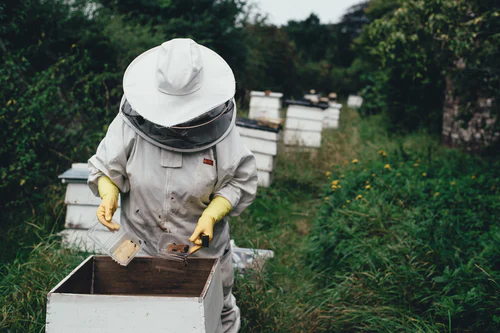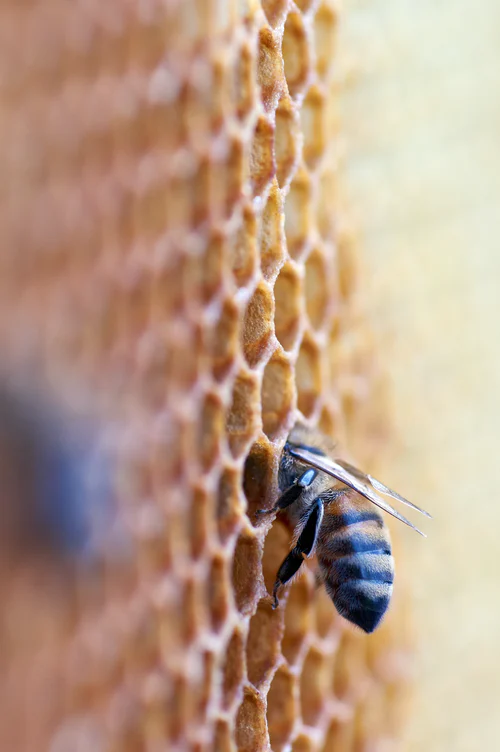The Mighty Worker Bee: Services that bees provide humans on a volunteer basis
This blog is part of a series, led by the Youth4Nature USA Team, to celebrate World Bee Day (May 20, 2020).
What would a world without bees look like?
Initially, we might think that a world without bees might mean a world without honey, which is devastating in and of itself. Then, we might consider that a world without bees may also mean a world without wildflowers, since almost every flowering plant requires pollination.
What we may not fully appreciate is the potential economic and cultural impact of losing bees.
Bees serving humans
Nature provides humans numerous “benefits,” dubbed ecosystem services. Humans may have tricked themselves into thinking that they could survive without these services, building massive concrete cities and homes lined with pesticides, but the truth is that without nature’s help we would have a lot to figure out. Bees - and the complex web of organisms in their orbit - are no exception.
1. Food
In fact, bees are the most economically important pollinators on this planet. They don’t just pollinate our flowers. Those tiny workers contribute over $3,000 USD per hectare to crop production… and that’s just wild bees. In the United States alone, this amounts to $15 billion USD of economic output, all done for free by bees. That’s $50 per American! To scale this out globally, between $235 and $577 USD worth of global crops is directly affected by pollinators. This number continues to grow as agricultural output increases. In the past 50 years, the amount of food produced with the help of pollinators increased by 300 percent.
Without bees, 35 percent of global food production would screech to a halt.
Do you like almonds? Those are almost exclusively pollinated by honeybees, and would be the first supply to disappear with the bees. How about blueberries and cherries? Say goodbye to those. Oh, and did I mention that coffee is dependent on bees as well?
2. Culture
For generations, bees have inspired art, music, religion, and technology. Indeed, all major global religions include sacred passages about bees and their contributions to our world. For example, in Islam, the Qur’an has an entire chapter dedicated to the bees: “The bee has insights into the secrets of nature, the secrets of creation, and a special connection therefore to the Creator.” These tiny flying insects are involved in significant historical practices and heritage sites, and have made their way into starring roles in children’s movies today.
If you’re looking for a way to support bees and incorporate safer, more sustainable products into your life, I recommend looking no further than your local beekeeper! Beeswax can be used to create candles and as an essential ingredient in natural deodorants and lotions. Not only that, but these products can be used in musical instruments, and for arts and crafts. Check out our blog post on bee products for some ideas.
3. Medicine
The benefits bees provide us start at pollination, but they don’t end there. Every culture has recognized the medicinal properties of bee products. Honey contains nutrients and antioxidants and is known to soothe a sore throat. Beeswax and honey are known for their anti-inflammatory, anti-bacterial, and anti-fungal properties. These qualities make those products perfect for products which may otherwise use synthetic chemicals.
4. Ecological Food Webs
When we lose bees, we don’t just lose one group of insects. Bees and other pollinators are at the bottom of the food chain, meaning if we lose them, many other organisms further up the chain will be impacted or may face extinction. Honeybees face predation by species of each taxonomy, including other insects, spiders, amphibians, reptiles, and mammals (like badgers and birds). The loss of bees could lead to the loss of these great species and a loss of greater biodiversity in our ecosystems.
5. Unforeseen Benefits
The nature-based solutions honeybees provide each day to this climate crisis aren’t limited to the benefits listed above. The crops that these creatures pollinate are today mainly used for food, but they’re also used in the search to find the perfect biofuel, natural fibers for clothing, materials for constructing without lumber, forage for livestock, and new medicines. Future scientists and naturalists may learn new powers the mighty bee holds, unlocking even greater potential for humans.
Why are we losing bees?
The climate and ecological crises negatively compound on vulnerable creatures like bees, which depend on the stability of their ecosystems. When humans introduce new species or disease to these habitats, they threaten the populations native to an area and therefore bees. When humans remove species through land intensification, they destroy bee habitats, giving them nowhere to go. Climate change presents unique threats to bees as they struggle to acclimate to changing weather patterns. Sadly, bees aren’t the only ones. Almost half of all invertebrate pollinator species are threatened by extinction.
Only two percent of bee species account for 80 percent of crop visits for pollination. While it may make logical sense to focus most of our effort into protecting these few species, ecological science shows that we’ll fare better if we broaden our focus to all bees and the preservation of their habitats.
Scientists have found 20,000 species of wild bees, which is fortunate because greater diversity means that bees as a whole have greater resilience to threatening changes. For example, two species of bees might feed on different plants. If a newly introduced disease wipes out all the food for one of the species, the other would survive, allowing other bee species to live on and move into the niches which may keep our food systems running.
So, a world without bees would mean a world that loses nourishment, beauty, and inspiration. This World Bee Day, remember to take the time to recognize all the work that these small creatures put into making your world a little bit better.
About the Author:
Emma Thornton is a lead member of the Youth4Nature USA team and an energy efficiency associate with Energy Solutions. She is a recent graduate of Northeastern University with expertise in sustainability and environmental justice, shaped by experiences with Environment America, Oxfam, J-PAL, Ceres, and NEJRC. When not researching climate solutions, Emma can be found walking dogs through Boston parks.




